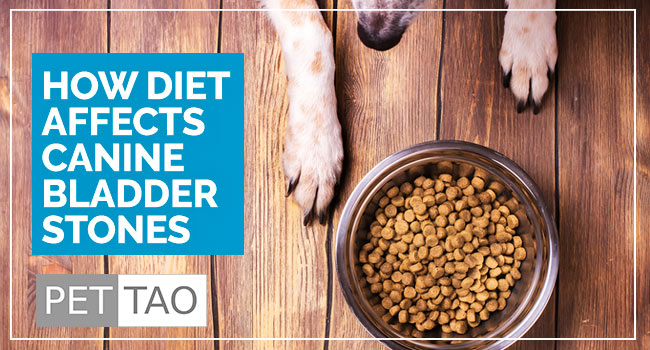Of course, he was speaking of people in a medically primitive society, but much of the sentiment holds true even today.
Everyone knows to eat fruits and vegetables, for instance, or to make a bowl of chicken noodle soup to ward off a cold.
The same concept holds true for dogs, especially when a syndrome involving the urinary system is the issue.
In other words, and of much relief to Spot, there are non-invasive ways to deal with all types of stones found in the urinary tract.
First, dietary considerations are vital for prevention.
As Drs. Lewis, Morris, and Hand report in Small Animal Clinical Nutrition, “A high protein intake results in an increased urinary concentration of both urea and ammonium and this aids struvite urolith formation. (10-8)”
Further, the doctors report magnesium, phosphate, and calcium concentrations in the dog’s urine have been shown to relate directly to the amount consumed.
In short, once urine-saturation levels are reached, stones can precipitate.
Therefore, the first step in knowing how to prevent bladder stones in dogs will always include managing dietary levels of the mineral consumption.
Don’t remove all calcium, magnesium, and phosphorus from your dog’s diet in a panic.
Calcium, Magnesium, and Phosphorus
Calcium, magnesium, and phosphorus are all vital nutrients.
You have heard of osteoporosis.
Strong bones need not only calcium but also the minerals phosphorus and magnesium.
Building strong bones is not the only function of these minerals.
In fact, as reported by the NAVC, “Reduced dietary phosphorus links to increased risk of calcium oxalate urolithiasis in dogs.”
I know you’re ready to throw up your hands in frustration! You’re probably contemplating the hard work ahead of you. And, probably you’re also longing for the days when Fred would throw Dino a brontosaurus steak and be done with it. But, remember, we are enlightened now!
It’s really a small price to pay for the years of loyal affection ahead of or behind you.
Treatment Options for Bladder Stones
Of course, as with all such options in our increasingly specialized world, you can now purchase special dog food for bladder stones.
Ask your vet about the cellulolytic diet.
However, it is important to remember dietary therapy alone will not always prevent calcium oxalate urolith recurrence.
In the wake of stone formation, there are still a few courses of action remaining.
You may want to ask the veterinarian the relative pluses and minuses of the differing treatments for canine bladder stones.
He will have a litany of treatments, from diet to drugs to laser lithotripsy to dissolve bladder stones in dogs.
Or he may indicate that Uro hydro propulsion, a fancy word for flushing, is his preferred procedure.
Whether your vet uses dissolving or flushing, the results will make at least one of you very happy, and Spot will be like a new dog.
I promise.
Another medical crisis which can arise is similar.
Reading the preceding pages, you may have asked, “Can dogs get kidney stones?”
The best answer is “it is not likely if you follow a canine kidney stones diet”, such as the cellulolytic diet your veterinarian will outline, or simply purchase dog food for kidney stones.
If prevention fails, though, dissolving kidney stones in dogs is desirable, possible, and effective. Ask your veterinarian.
Powerful Tools to Help Your Dog’s Urinary Tract & Bladder Challenges
There are many quick and easy changes you can make at home to help you give your dog an edge on easing urinary tract challenges.
- Learn more about dog bladder and kidney stone health challenges.
- Provide bladder support. PET | TAO Soothe Bladder is a blend of Eastern herbs and Western supplements working together to soothe your dog’s bladder and urinary tract.
- Consider a Cooling Diet. PET | TAO Chill cools inflammation caused by infection. Make sure to discuss any dietary changes with your holistic vet.
- Try PET | TAO Freeze Dried Beef Kidney Treats. According to TCVM, kidney controls kidney, bladder, and urinary tract functions. As few as 5-6 treats per day can make a huge difference in your urinary tract and bladder health!
- Learn more about TCVM Herbal Remedies. Chinese medicine offers many amazing natural solutions for canine bladder and urinary health challenges. Some good examples are:








